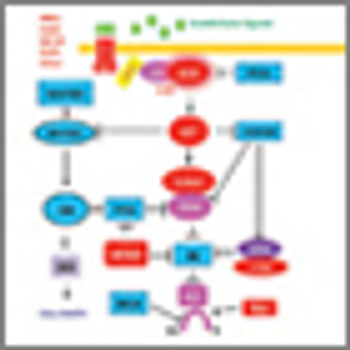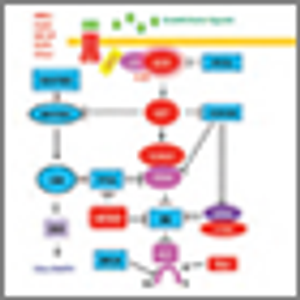
This article aims to provide an overview of The Cancer Genome Atlas findings, with a particular focus on their potential biological relevance and therapeutic implications.

Your AI-Trained Oncology Knowledge Connection!


This article aims to provide an overview of The Cancer Genome Atlas findings, with a particular focus on their potential biological relevance and therapeutic implications.

It is time to develop more active treatments in the early-disease setting that actually eradicate ER-positive breast cancer before new mutations and secondary resistance have a chance to develop. In this regard, standard chemotherapy is not the answer.

Poly(adenosine diphosphate [ADP]–ribose) polymerase (PARP) inhibitors are designed to exploit the “synthetic lethality” concept for cancer therapy.

Anderson et al highlight the Breast Health Global Initiative for guideline development and discuss how developments in low and middle income countries have parallels in the delivery of health care to underserved populations in industrialized countries. Guidelines for appropriate breast cancer treatment must address early detection, accurate diagnosis, and the delivery of timely and appropriate treatment modalities.

This article reviews ongoing progress in the effort to identify predictors of endocrine therapy responsiveness for breast cancer and discusses the value of “pre-treatment” vs “on-treatment” tumor profiling for predicting outcomes.

In this article, we review the underlying biology and pharmacology behind lapatinib and summarize clinical trials with lapatinib. We also describe the ongoing clinical trials that use lapatinib as part of adjuvant and neoadjuvant therapy. These trials could change the standard of care in the next few years.

For many oncologists, neoadjuvant treatment for breast cancer issynonymous with preoperative cytotoxic chemotherapy, regardless oftumor characteristics. Preoperative therapy with an endocrine agent isgenerally considered suitable only for the frail elderly or the medicallyunfit. However, favorable information regarding third-generationaromatase inhibitors in the treatment of all stages of breast cancerprompts a reconsideration of this bias. In light of the fact thatneoadjuvant therapy with aromatase inhibitors is restricted to postmenopausalwomen with strongly estrogen-receptor–positive tumors, the assumptionthat neoadjuvant combination chemotherapy is more efficaciousthan a third-generation aromatase inhibitor can be reasonablyquestioned. It is particularly remarkable that the outcome of a comparisonof adjuvant tamoxifen vs anastrozole (Arimidex)-the Arimidex,Tamoxifen Alone or in Combination (ATAC) trial-in more than 6,000patients was predicted by a neoadjuvant trial that showed an efficacyadvantage for a third-generation aromatase inhibitor (letrozole[Femara]) compared to tamoxifen in a sample of 337 patients afteronly 4 months of treatment. The potential of the neoadjuvant setting inefforts to identify new biologic agents that could build on the effectivenessof adjuvant aromatase inhibitors is therefore beginning to be appreciated.Finally, neoadjuvant therapy with an aromatase inhibitorcould be considered a sensitivity test of endocrine therapy that might beincorporated into strategies to individualize treatment according to response.For this possibility to be realized, however, a better understandingof the relationship between surrogates from the neoadjuvant settingand the long-term outcome of adjuvant aromatase inhibitor therapywill have to be established through practice-setting clinical trials.

Breast cancer oncologists makechoices between agents withinthe same therapeutic classevery day-eg, paclitaxel vs docetaxel(Taxotere), doxorubicin vs epirubicin(Ellence), tamoxifen vs anaromatase inhibitor. In the case ofchemotherapeutic agents, we do notyet have results from adequately powereddirect comparisons, and so, decisionsare based on indirectcomparisons between trials, safetyconsiderations, side-effect profiles,cost considerations, and clinical experience.In the case of adjuvantaromatase inhibitor therapy vs tamoxifen,the results of a huge trial areavailable to consider and, indeed, reconsider.In the years to come, theArimidex, Tamoxifen Alone or inCombination (ATAC) trial experiencewill be augmented with resultsfrom multiple other trials that addressalmost all the worthwhile clinicalquestions (except 5 vs 10 yearsof an aromatase inhibitor).

Although a substantial number of women will suffer and die from breast cancer during the upcoming years, we clearly have made stepwise progress in treating patients with this cancer over the last 3 decades. Each of these steps of progress has led to

Published: August 1st 1999 | Updated:

Published: October 12th 2011 | Updated:

Published: September 1st 2008 | Updated:

Published: August 10th 2012 | Updated:

Published: March 1st 2003 | Updated:

Published: December 15th 2013 | Updated: